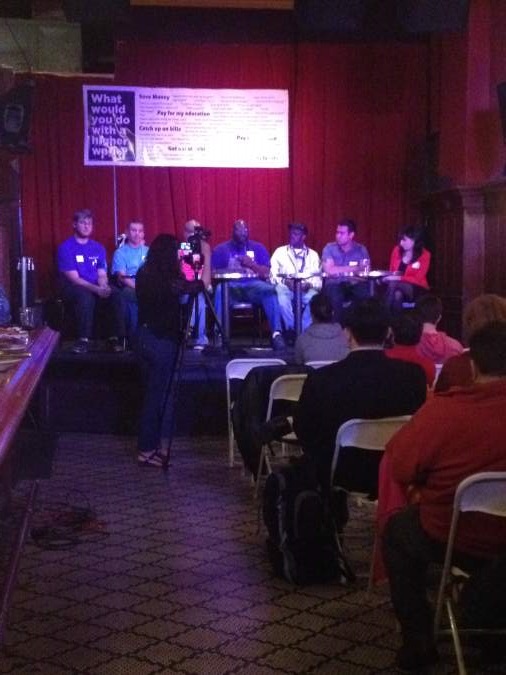Servers in Washington make $8.67 an hour plus tips. On Jan. 1, their hourly wages will increase to $9.04, the nation’s highest minimum wage. Under the terms of Initiative 688, approved in 1998, the minimum wage will continue to be adjusted annually to reflect the rising cost of living. According to the Washington Restaurant Association, the typical server makes $22.42 an hour. That’s a fair sum for someone charged with knowing every item on a menu, pacifying angry drunks, and carrying trays weighed down with 40 pounds of food. But restaurant owners can’t afford their share, so they’ve spent the past decade cutting jobs—and the drive to downsize has only intensified with the recession.
Washington has three fewer employees per restaurant than the national average. That means servers in Washington typically handle five to six tables at once, instead of three to four. Those figures make a difference when a diner wants another cocktail or is looking to send back a steak that wasn’t cooked to the right temperature. Anthony Anton, president of the Washington Restaurant Association, says restaurant owners haven’t necessarily scaled back their server numbers. But many of them have dropped bussers, forcing servers to clear plates instead of interacting with guests.
A Seattle restaurant consultant who recently traveled to Arizona was shocked to find “a ton of people on the floor” at 1:30 p.m., Anton says. “They told him they ‘bus up’ so the servers can focus on tables,” he recalls. That would never happen in Seattle.
Furthermore, I don’t remember a manager in Seattle ever dropping by my table to make sure everything was OK. Anton thinks that could be because managers are spending more time in the kitchen, washing dishes. They’re not supervising front-of-the-house staff or meeting with fellow restaurant owners to craft solutions to the labor-cost problem. “We have more and more operators unable to attend meetings because they have to cover shifts,” Anton says.
To recoup the money spent on server pay, many restaurants are now trimming kitchen salaries. “The biggest hurt has been put on kitchen staff,” Anton says. “Lead-cook wages really haven’t moved in a long time.”
According to Anton, labor costs account for 36 percent of restaurants’ operating expenses. The percentage is especially high in Washington because it’s one of seven states that prohibit employers from calculating tips as wages. “When they put the initiative on the ballot, they didn’t write in any exemptions,” Anton explains.
Of course, all small business owners are contending with the minimum-wage hike, not just restaurant owners. Many businesses have passed the new costs on to their customers by raising prices. So why don’t restaurants do the same? Opponents of the tip system have long characterized restaurant owners’ reluctance to fairly compensate their servers as barbaric, suggesting they should charge whatever it takes to remove the tip line from guest checks. But I’m not sure diners are ready to pay $17 for a chicken sandwich. According to a new report from Nation’s Restaurant News, a majority of Americans plan to slash their eating-out expenses in the coming year.
Restaurant owners are understandably skittish about the minimum-wage issue, since it’s impolitic to suggest that anyone outside of a corporate boardroom should be earning less money. But the Washington Restaurant Association plans to keep lobbying for a tip exemption. If server wages dropped to $5 plus tips—more than twice what servers now earn in North Carolina, where I last wore a server’s apron—I believe servers wouldn’t have much trouble making up the lost pay with tips from customers grateful for the extra attention.
Servers need the freedom a busser brings. And plenty of potential bussers need the work. While there’s no guarantee restaurant owners would make good on their promises to hire more staffers instead of pocketing the extra dough, they deserve a chance to do the right thing.
But Anton doesn’t think the state is likely to revise its wage regulations anytime soon. “I would hope, at some point, the problem is so well-understood that people on every side come together, but I don’t think we’re at that stage today,” he says.








